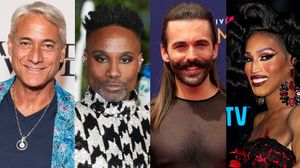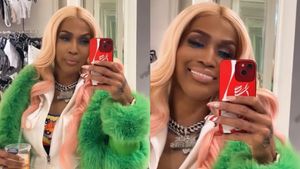When gay and
lesbian couples started getting married in California this
week, one set of voices was quiet among the choruses of
''Here Come the Brides'' -- those of the conservative
activists who put a same-sex marriage ban on the
November ballot.
Instead of
appearing in front of the television cameras that recorded
joyful couples applying for marriage licenses, the sponsors
of the California Marriage Protection Act remained on
the sidelines and cautioned their supporters against
disrupting weddings.
''We wish these
same-sex couples well, our beef is not with them, but
with the judges who have the arrogance to rule that
California's marriage laws the voters approved are
somehow akin to racial discrimination,'' Brian Brown,
executive director of the National Organization for
Marriage-California, said in a statement.
The low-key
tactics show that opponents of same-sex marriage are
concentrating on politically moderate voters as they try to
add California to the list of 26 other states with
constitutional amendments outlawing gay nuptials.
At least one
recent poll showed registered voters leaning against the
ballot measure -- though results have been mixed -- and
people involved in the campaign said the effort could
be doomed if gay-marriage opponents come off as
mean-spirited.
''This campaign
represents the broad majority of Californians who support
marriage but are also very decent and tolerant people.
Decent and tolerant people don't show up to harass and
intimidate anyone,'' said Andrew Pugno, legal adviser
to ProtectMarriage.com, a coalition of religious and
social conservative groups that sponsored the initiative.
For their part,
gay rights activists urged same-sex couples and their
supporters to afford the occasion the dignity it deserved.
San Francisco mayor Gavin Newsom, who officiated the
wedding of two lesbian activists in their 80s,
dissuaded couples, for instance, from scheduling group
weddings or wearing elaborate costumes.
''Everybody is
saying to their supporters on both sides, 'Tamp it down,
don't be outrageous in your conduct because it will turn
people off,''' said Bob Stern, president of the Los
Angeles-based Center for Governmental Studies, an
independent nonpartisan think tank. ''No outrageous
displays of affection and no outrageous displays of hatred,
because everybody is appealing to the middle.''
As part of their
strategy, gay-rights groups are attempting to
characterize the amendment's backers as extremists who are
out of touch with attitudes in California. They point
to the full-page advertisements the Washington,
D.C.-based Family Research Council took out in The
Orange County Register and The Sacramento Bee
on Sunday, saying the start of legal same-sex marriage
would lead to the term father being removed
from birth certificates.
''If you look at
what the other side has been talking about recently,
they are not talking about lesbian and gay couples,'' said
Geoffrey Kors, executive director of Equality
California, the state's largest gay rights group.
''They want to raise all kind of other issues because the
way they feel they can have success is through fear.
''But fear won't
work now because the public now sees lesbian and gay
couples getting married, and there is nothing to be
concerned about,'' Kors said.
Pugno said it was
too soon to say how the amendment's backers would use
images from the week of weddings in their campaign. While so
far their message has focused on the actions of the
supreme court majority that struck down the state's
one-man one-woman marriage laws, pictures of two
brides and two grooms could be used to convince voters that
the definition of marriage is in their hands.
''In many ways,
the images are a daily reminder that this major social
change did not come through the democratic process but from
a 4-to-3 vote of the supreme court, and that will keep
it fresh in the voters' minds,'' he said.
Maggie Linden, a
public relations executive who is working on the
campaign to defeat the referendum, said the extensive media
coverage of couples standing in front of clergy with
their parents and children at their sides will help
make the case for, not against, same-sex marriage.
''Californians
fundamentally, time and time again, vote in a way that
says we believe in equality and we don't want people treated
differently,'' Linden said. ''The images of yesterday and
the day before are exactly those images -- they are
living and committed lesbian and gay couples who are
exercising their fundamental rights like everyone else.''
Kors said
same-sex-marriage supporters will be recruiting volunteers
and seeking campaign donations not only at gay pride
parades but at county fairs and other events.
''The support for
freedom to marry is broad and widespread, and the
opposition is really limited to right-wing organizations,''
he said.
The ballot
initiative would amend the state constitution to ''provide
that only marriage between a man and a woman is valid or
recognized in California.'' Its language was taken
directly from a gay marriage ban enacted by voters in
2000, one of two the state supreme court found
unconstitutional and struck down on May 15.
Opponents and
supporters of the November marriage amendment say they
could together spend $30 million campaigning. If their
predictions prove true, that would be more than the
nearly $27 million that was spent combined in the 24
states where such measures have been put to voters
since 2004, according to figures compiled by the National
Organization on Money in State Politics.
Donations from
organizations and individuals outside California are
expected to play a large role in financing the referendum
fight. Focus on the Family, a Christian conservative
group based in Colorado, and the Washington-based
Human Rights Campaign, a national gay rights
organization, already have invested heavily in the campaign.
(Lisa Leff, Amanda Fehd, AP)

















































































